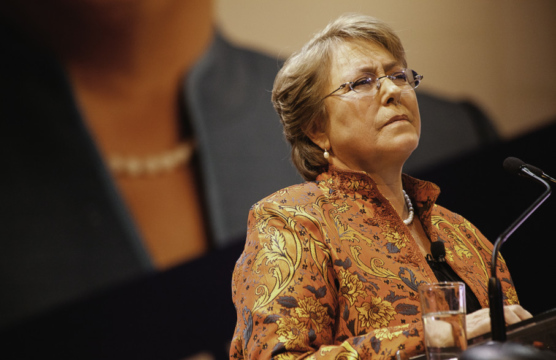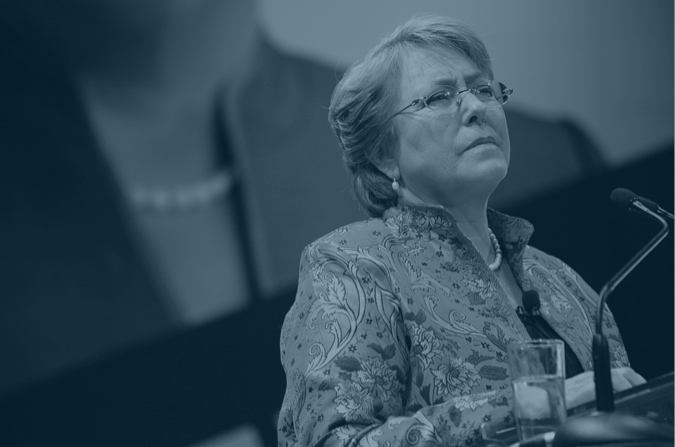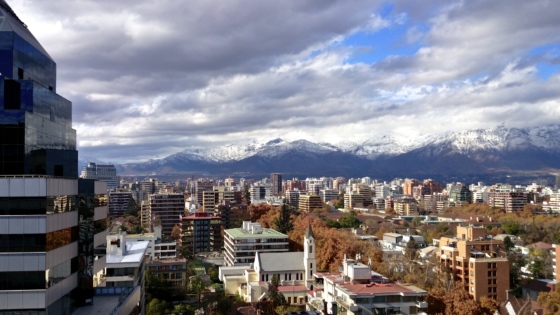
Bachelet’s Regional Challenges
Even before Michelle Bachelet began her second term she got a taste of the difficult regional climate she will have to deal with over the next four years.
On April 29, the Dialogue hosted an in-depth conversation with UN High Commissioner for Human Rights Michelle Bachelet on the implications of the Covid-19 pandemic in the state of human rights in Latin America. Michael Shifter, president of the Dialogue, moderated the conservation. As a two-time former president of Chile, former head of UN Women, and former health minister and practicing physician, High Commissioner Bachelet is uniquely attuned to how Covid-19 is impacting human rights in the region. Bachelet is also former co-chair of the Board of Directors at the Inter-American Dialogue.
The Covid-19 pandemic is the most severe health crisis in decades, with severe social and economic impacts. To begin her intervention, Bachelet stressed the continuous need for governments to ensure that their emergency measures protect both their citizens and the rule of law. The virus does not discriminate; however, the impacts are disproportionate and affect the most vulnerable populations. One of the main concerns is the protection of migrants in the region. In Guatemala, migrants are returning with no sanitary safeguards in place, including deportees from the United States who have tested positive for Covid-19 upon return.
Awareness-raising campaigns and the dissemination of accurate, precise, and evidence-based information are the most effective tools. Bachelet called the governments of the region to uphold transparency, responsiveness, and accountability in their actions against the virus. Her office has received reports of the abuse of force in Latin American countries to enforce quarantine measures. In El Salvador, people were arrested and detained in often overcrowded conditions ignoring repeated rulings of the Supreme Court against such actions.
Bachelet drew attention to the effect of this crisis on women and girls who are at high risk due to pre-existing discrimination and inequality. For this reason, the response to Covid-19 must consider gender-specific experiences and needs. In Brazil, the Rio de Janeiro Public Defender for Women's Rights indicated that cases of domestic violence had increased by 50 percent during the confinement period. In Peru, women emergency centers and hotlines are working with limited capacity, leaving many cases unattended. Bachelet stated that support services should be declared essential and remain open, and victims should be informed about available services. Countries like Argentina and Costa Rica are taking essential measures against gender violence.
According to ECLAC, the pandemic will lead to the biggest contraction in economic activity in the history of the region: a -5.3 percent drop in 2020. This situation will have a regional impact, but it will especially affect women in the low-wage and informal sectors, indigenous women, and women in the health sector. Referring to indigenous women, Bachelet warned that "their access to livelihood is at risk and the threat of hunger is becoming very real." Furthermore, her office has received reports about the limited availability of health-related information in indigenous languages. Women are also impacted by the increase in unpaid care work due to lockdowns, the limitations in sexual and reproductive health services, the lack of basic products to combat Covid-19.
Bachelet said that her office is supporting several response efforts in different countries in the region. In El Salvador, the Office of the United Nations High Commissioner for Human Rights is providing technical support to civil society organizations and state institutions that work for the legal defense of women deprived of liberty. In Panama, her office is working with indigenous authorities, women's organizations and the government to facilitate access to healthcare information. Furthermore, her office has issued guidelines, for example: to ensure that women health workers have adequate access to personal protective equipment and that medical care is available and accessible by all women, including sexual and reproductive health services; to promote equal caregiving responsibilities; to declare services related to gender-based violence as essential. Bachelet also recognized that there is a leadership gap in the decision making for Covid-19 responses at a state level. "Gender equality is not an option, nor can it be cast aside in times of crisis," the High Commissioner said.
Responding to Michael Shifter, Bachelet stated that globally we are lacking coordinated actions with other states to address the pandemic. In Latin America, she has not seen a regional effort. The responses have varied a lot from country to country in regards to lockdowns, testing, and the response capacity from the different health systems. On the other hand, Bachelet recognized that ECLAC and PAHO are attempting to coordinate efforts in the economic and health front, respectively. There is still a gap to consolidate a coherent and cohesive response in the region. Bachelet highlighted the constant work of the Human Rights Council to work with governments in the region to assess human rights violations. In Venezuela, they count on a fact-finding commission that will continue working during the pandemic. Bachelet affirmed that the role of civil society organizations (CSOs) is fundamental for the protection of human rights in Latin America. The Covid-19 responses need the engagement of all communities, and CSOs are embedded in these communities. CSOs can also be very useful to include women in the decision-making of responses. Bachelet also mentioned the critical role that private enterprises have taken responding to the crisis and addressing inequalities in the communities where they are located.
A Q&A with the audience followed Bachelet's intervention. The audience asked questions regarding the role of the military and the use of state power in the Covid response in Latin America. Bachelet explained that including the military in the response is not a problem if the rules of their engagement are set, the problem arises when the military does the work of the police. Some other questions followed inquiring about the responses in specific countries in the region. The High Commissioner closed the event hoping that after this pandemic, Latin American countries will realize that investing in education and health are an important mechanism to battle inequality in the region.
Statement by United Nations High Commissioner for Human Rights, Michelle Bachelet (English | Español)
(April 29, 2020 - OHCHR)
Michelle Bachelet points out the four big issues Latin America needs to face while fighting the pandemic
(April 30, 2020 - LABS)
La mitad de los trabajadores del mundo podría perder su empleo por la pandemia, advirtió la OIT
(April 29, 2020 - La Nación)
Bachelet: Medidas de excepción solo deben ser usadas para lidiar con el virus
(April 29, 2020 - El Universal)
Bukele sigue en la mira de la ONU por acciones arbitrarias
(April 30, 2020 - El Salvador.com)
U.N. Rights Official Warns of ‘Excessive Force’ Amid Pandemic
(April 29, 2020 - US News)
Even before Michelle Bachelet began her second term she got a taste of the difficult regional climate she will have to deal with over the next four years.
Bachelet has started her term with an ambitious agenda that includes tax, education, and constitutional reforms.
El ex ministro está convencido de que el ex mandatario es la mejor carta de la Nueva Mayoría para enfrentar a la derecha en 2017 y encabezar un programa que rectifique las reformas, pese al desfavorable escenario político que reflejó la encuesta CE.
 Michelle Bachelet / Flickr / CC BY-SA 2.0
Michelle Bachelet / Flickr / CC BY-SA 2.0
